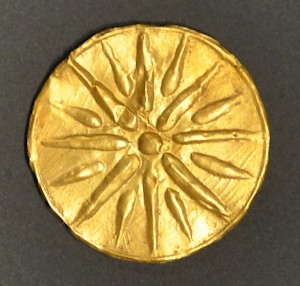Herodotus on the Macedonian royal House

In the eighth book of Herodotus' Histories, he tells about the ancestors of the Macedonian king Alexander I the Philhellene, who was king of Macedonia in the first quarter of the fifth century BC.
Although the story assumes that Alexander's legendary ancestor Perdiccas (who must have lived in the seventh century BCE) was a descendant of Temenus of Argos, who in turn descended from Zeus' son Heracles, the story appears to betray an older myth that connected Perdiccas to the sun. In historical times, the sun was one of the symbols of the Macedonian royal house.
The Macedonian Royal House
[8.137] Now of this Alexander the seventh ancestor was that Perdiccas who first became despot of the Macedonians, and that in the manner which here follows:
From Argos fled to the Illyrians three brothers of the descendants of Temenus, Gauanes, Aeropus, and Perdiccas; and passing over from the Illyrians into the upper parts of Macedonia they came to the city of Lebaia. There they became farm servants for pay in the household of the king, one pasturing horses, the second oxen, and the youngest of them, Perdiccas, the smaller kinds of cattle; for in ancient times even those who were 'rulers over men'note were poor in money, and not the common people only.
The queen cooked for them their food herself. And whenever she baked, the loaf of the boy their servant, namely Perdiccas, became double as large as by nature it should be. When this happened constantly in the same manner, she told it to her husband, and he understood that this was a portent and tended to something great. He summoned the farm-servants, and ordered them to depart out of his land. They replied that it was right that before they went forth they should receive the wages which were due.
Now it chanced that the sun was shining into the house down through the opening which received the smoke, and the king when he heard about the wages said, being inspired by a divine power: "I pay you then this for wages, and it is such as you deserve," pointing to the sunlight.
Gauanes and Aeropus, the elder brothers, stood struck with amazement when they heard this, but the boy, who happened to have in his hand a knife, said: "We accept, oh king, that which you gave", and he traced a line with his knife round the sunlight on the floor of the house, and having traced the line round he thrice drew of the sunlight into his bosom, and after that he departed both himself and his fellows.note
[8.138] They were going away, and one of those who sat near the king at table told what the boy had done, and how he had taken that which was given with some design. When the king heard this, he was moved with anger, and sent horsemen to slay them. Now there is a river in this land to which the descendants of these men from Argos sacrifice as a savior. This river, so soon as the sons of Temenus had passed over it, began to flow with such great volume of water that the horsemen became unable to pass over.
So the brothers, having come to another region of Macedonia, took up their dwelling near the gardens of Midas the son of Gordias, where roses grow wild which have each one sixty petals and excel all others in perfume. [...] Above the gardens is situated a mountain called Bermion, which is inaccessible because of the cold. Having taken possession of that region, they made this their starting-point, and proceeded to subdue the rest of Macedonia.
From this Perdiccas, Alexander descended as follows: Alexander was the son of Amyntas, Amyntas was the son of Alcetes, the father of Alcetes was Aeropus, of him Philip, of Philip Argaeus, and of this last the father was Perdiccas, who first obtained the kingdom.